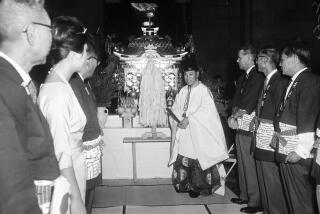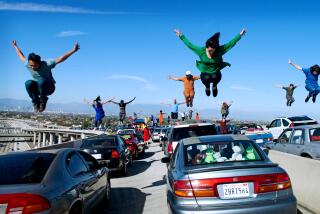Seoul ’88 : Korean Mascot Caught Tiger by the Tale
- Share via
SEOUL — The first Olympics I covered was in 1976 at Montreal, where the mascot was Amik, a meek sea lion. I don’t remember him. I thought the mascot was Nadia Comaneci.
Many people contend that Peter Ueberroth was the face of the Los Angeles Olympics to the rest of the world, but that is not the case. When is the last time you saw a Peter Ueberroth key chain? Sam the Eagle has his mug on mugs from Bangkok to Bucharest.
Actually, Sam was so disgustingly happy all the time, not once complaining about the traffic, the smog or Zola Budd, that one had to wonder whether he was even American. Suspicions were heightened when his brother, Eddie, showed up in Calgary this winter to compete for Great Britain.
Calgary’s Olympics gave us Hidy and Howdy, the polar bears. I couldn’t see the need at first for two mascots, but then I realized that Frank and Kathie Lee Gifford needed day jobs.
That brings us to Hodori, the tiger mascot of the Seoul Olympics.
Why was a tiger chosen when there hasn’t been one on the Korean peninsula since early in this century? And it’s a good thing, too, because his sole contribution to Korean society was in the area of population control. Many Koreans today tell stories of ancestors being devoured by tigers.
Yet, do they blame the tigers? No, they blame the Japanese.
But then Koreans blame almost everything on the Japanese, who included the peninsula in their domain from 1910-45. Koreans claim that the tigers invaded villages unchallenged because their ancestors were forbidden by the Japanese to bear arms. Think about that the next time you’re asked to contribute to the gun control lobby.
Despite their culinary preferences, tigers are almost never depicted in Korea as anything but friendly, happy and wise. The only times they appear angry are when they are fighting evil.
For instance, The Korea Times, an English language newspaper in Seoul, published a cartoon on the editorial page Sunday of a scowling Hodori preparing to pounce on subway cars. Subway workers have been threatening to strike during the Olympics, although the latest word is that they will wait until afterward.
Hodori, by the way, means little tiger. According to French journalist Vincent Ricquart’s recent book, “The Games Within the Games,” Chun Doo Hwan, who was South Korea’s president until February of this year, chose the name because that was his nickname at the Military Academy.
Tigers are important in Korean culture. When the elders place their grandchildren on their laps to read them stories, they don’t begin with “once upon a time.” They begin with “when the tiger smoked a long pipe.”
One of the stories the grandparents tell is of Korea’s origin. According to legend, a she-bear and a tigress, who were living together in a cave, wanted to become humans. They prayed to the heavenly emperor, Whanin, who told them that he would grant their wishes if they could withstand a test.
Supplying them only with some ssuk, a form of grass that can be eaten for nourishment and medication, and 20 cloves of garlic, he told them to remain in their cave and avoid sunlight for 100 days.
The tigress almost lost her mind, not to mention her tan, and bolted from the cave after only a few days, forfeiting her chance to become human. But the bear stayed and was rewarded when she became a beautiful woman. Whanin then sent his son, Whanwung, to marry her, and their son, Tankun, became the father of Korea.
If you wonder why the tiger and not the bear became so important in the country’s folklore, that’s a question that many Koreans can’t answer. But I do know that a bear wouldn’t have been acceptable as the Olympic mascot for Seoul because Moscow had one, Misha, in 1980.
On an international level, Hodori is probably the most controversial Olympic mascot. Officials from Kellogg’s said that he too closely resembled Tony the Tiger and threatened the Seoul Olympic Organizing Committee (SLOOC) with a lawsuit for copyright infringement. SLOOC officials said that they were immune because South Korea, at that time, wasn’t a member of the Geneva Copyright Convention.
Eventually, the two sides reached a compromise. SLOOC agreed that it wouldn’t sell the rights to the mascot to any other cereal company in the United States, and that Hodori would no longer go around saying, “The Olympics are Grrrr . . . eat!”
The organizing committees for the 1992 Olympics, the Winter Games in Albertville, France and the Summer Games in Barcelona, Spain, already have selected their mascots, and Barcelona’s choice wasn’t too popular among some citizens.
As explained last week by Josep Fernandez, the organizing committee’s director of image and communications, the only animal associated with Spain is the dragon slain by Saint George. “A dead dragon, that is not so good,” he said. So the organizing committee chose a dog, like the ones used by Spanish sheepherders.
Fernandez suggested that the dog’s critics should get a sense of humor.
A dog never would have done in Seoul. The fear would have been that someone would stick a fork in it.
If that reference offends my South Korean friends, I apologize. Everyone recognizes that the government is doing the best it can to discourage people here from eating the animal. Respectable restaurants don’t serve it, and others are either being forced to close, move to the back alleys or at least remove it from their menus.
Still, it’s a fact that a few Koreans, very few if you believe the government image makers, eat dog because they consider it good for their health. They insist that they aren’t eating your everyday house pet but dogs that are specially bred for that purpose. They say that the quality of the canine is so high that it is called K-10.
Personally, I don’t think that the Koreans should be so sensitive about this issue. Each culture has its own peculiarities. Heaven knows that we Americans have dishes that are considered offensive in other parts of the world.
Mike Moran, director of public information for the U.S. Olympic Committee, said here Saturday night that some animal rights activists have demanded that the U.S. boycott the Seoul Olympics because of the dog restaurants.
“One suggested that if we ban South Africa from the Olympic movement because of human rights issues, we should not go to Seoul because of animal rights issues,” Moran said.
Moran said that he told the man that India’s athletes, many of them Hindu vegetarians who consider cows sacred, didn’t leave the Los Angeles Olympics the first time they spotted a Sizzler.
More to Read
Go beyond the scoreboard
Get the latest on L.A.'s teams in the daily Sports Report newsletter.
You may occasionally receive promotional content from the Los Angeles Times.






